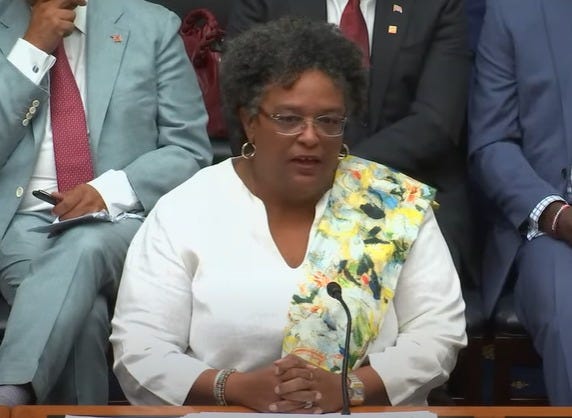Barbados' Mottley Bats For Caribbean Countries Facing 'Unfair' International Designations That Raise Risk Profile

Almost a year after her rip-roaring speech to the international community at COP26 in Glasgow on the need for more climate-financing to protect vulnerable states like those in the Caribbean, Barbados’ Prime Minister Mia Mottley was in the global spotlight once again on Wednesday, this time calling out what she believes are onerous financial rules being imposed by the U.S. and other industrialized nations that make Caribbean markets uncompetitive.
Her appearance before the House Committee on Financial Services discussing the impact of financial de-risking in the Caribbean was the first time in nearly 40 years that a prime minister had addressed the U.S. Congress.
Prime Minister Mottley told the audience of U.S. lawmakers that the placement of Caribbean countries, like Barbados, Jamaica and The Cayman Islands, on a global grey list, has raised their perception of risk. She said this “unjust listing” by the Financial Action Task Force (FATF), in which the U.S. Treasury participates, has made them out to be jurisdictions plagued with financial crimes like money laundering and terrorism financing, while countries with much greater levels of suspicious activities aren’t targeted.
As an example, she highlighted the criticism faced by Ugland House in the Cayman Islands, “which houses over 12,000 companies.”
“The impression given is that this could be a tax scam without acknowledging that in the [U.S.] state of Delaware, there is a similar building that houses over 300,000 companies, including some of the largest companies in the world,” she stated in her prepared remarks.
Ms. Mottley explained that the designation from FATF and other groups like the Organisation for Economic Cooperation and Development (OECD), has led to correspondent banks performing enhanced due diligence, which has raised compliance costs. As a result, most CARICOM member states have lost more than 30% of their relationships with correspondent banks, which process international payments in order to facilitate trade.
“This can’t be fair,” she said. “We do not make enough clothes; we do not produce our own food; we do not produce our own equipment, and therefore, unless we are able to trade with the rest of the world, we are at risk of becoming financial pariahs.”

Ms. Mottley explained that the more stringent regulatory policies now restrict the conduct of certain business within Caribbean countries such as trading in gold and the management of casinos. Also impacted by the enhanced measures, are areas such as remittances, international investment and tourism, on which the region heavily depends. Plus, productivity levels and the quality of life of the region’s citizens are being eroded when the enhanced rules increase the time it takes to conduct a basic business transaction, like opening a bank account, which can take up to a week in some Caribbean nations while the same process would be completed in a matter of hours elsewhere.
The advent of de-risking in the region dates back to 2012 in Jamaica, Ms. Mottley stated.
Back then, based on media reports, a proliferation of scammers would call mostly elderly victims in the United States and trick them into sending fees through money-service providers purportedly to claim lottery winnings that ended up being fake.
But Jamaica has since established the Anti-Lottery Scam Task Force, resulting in numerous arrests and extraditions to the United States.
Other Caribbean countries found wanting are also actively working with FATF to address deficiencies in their regimes within agreed-upon timeframes.
Prime Minister Mottley said that some Caribbean countries were not even listed because of proven substantial illicit financial activities like money laundering, but simply because of an inability to quickly comply with ever-changing standards.
There are also inconsistencies.
She highlighted the case of Trinidad & Tobago, which was removed from the FATF list, but remains on the E.U.’s list.
“Such mixed messaging and lack of transparency fuels misunderstandings of risk and de-risking,” she explained.
Ms. Mottley urged the committee to “create conditions where our countries can benefit and where our countries can have a level playing field in order to be able to achieve prosperity for our citizens who expect education, healthcare and opportunities for trading.”
As a practical step, she suggested that the U.S. Treasury be more risk sensitive by focusing on countries where the illicit activities are taking place as opposed to those countries who are not complying with all the standards. Additionally, she recommended assessing a country’s compliance with the regulations in real time - as soon as changes are made - to ensure that countries who meet the requirements after the annual assessment is done are not forced to wait until the next yearly review, which could result in losses in the millions of dollars.
##
Damario Patterson is a new writer for 18º North and is also a youth ambassador with VM FETE, which promotes financial literacy among youth.



Lovely coherent articulation of this strong message Damario. Looking forward to more!